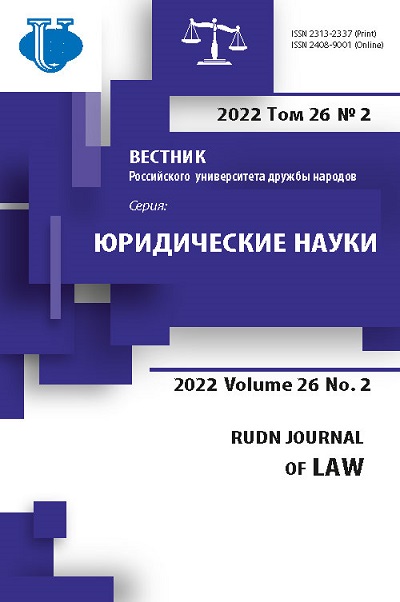Nomothetae: Friedrich Hayek’s project of a constitutional reform
- Authors: Raab R.S.1
-
Affiliations:
- Higher School of Economics (HSE)
- Issue: Vol 26, No 2 (2022)
- Pages: 348-368
- Section: CONSTITUTIONAL AND MUNICIPAL LAW
- URL: https://journals.rudn.ru/law/article/view/31089
- DOI: https://doi.org/10.22363/2313-2337-2022-26-2-348-368
- ID: 31089
Cite item
Full Text
Abstract
The article offers a comprehensive reconstruction of a constitutional reform project, proposed by a well-known economist Friedrich Hayek. The reconstruction implies recognition of three interconnected aspects. The first theoretical aspect deals with the key problem of a democratic government - the problem of empowering parliaments with two dangerously “mixed” powers, namely the power to manage specific resources and the power to proclaim abstract rules of justice. Hayek proposes to enshrine a clear definition of the rules of justice in order not to confuse the development of these rules with the solution of resource management issues. The theoretical aspect is followed by the institutional aspect of the constitutional reform. The institutional aspect of the reform implies formation of a special representative body whose exclusive competence would be strictly limited to proclamation of the abstract rules of justice. Formation of such a representative body is the only way to avoid unjustified empowerment of the same people to decide both the questions of justice and current budget policy. To make sure that these questions will not be treated in the same political manner, Hayek leaves a few remarks concerning the type of mind that most fit to deal with the rules of just conduct. These remarks constitute the third, «anthropological» aspect of the reform project. In accordance with this third aspect, not every type of mind is inclined to prefer justice over the other, more utilitarian issues. It is that type of mind which is prone to follow customary «opinion» rather than organizational «will» that is more reliable when it comes to the matters of justice and its rules. And though this «anthropological» aspect is not at the center of the Hayek’s reform project, it seems to be one of the most characterizing elements of his constitutional proposal. In one way or another, all the other elements can be derived from this anthropological division between «opinion» and «will», which means that Hayekian reform project is based not only on his political preferences, but also underpinned by his epistemological theory.
About the authors
Ruslan S. Raab
Higher School of Economics (HSE)
Author for correspondence.
Email: belchikroma@gmail.com
ORCID iD: 0000-0001-5506-152X
Lecturer of the Department of Theory of Law and Interdisciplinary Legal Disciplines, Faculty of Law
3 B. Trekhsvyatitel'skij per., Moscow, 109028, Russian FederationReferences
- Berman, H. J. (1998) Law and Revolution: The Formation of The Western Legal Tradition. Moscow, Norma Publ. (in Russian).
- Burke, E. (2001) Politics, Government and Society. Moscow, KANON-press-C Publ. (in Russian).
- Caldwell, B. (2004) Hayek’s Challenge: An Intellectual Biography of F.A. Hayek. Chicago, The University of Chicago Press.
- Crowe, J. (2014) Radicalising Hayekian Constitutionalism. University of Queensland Law Review. 33 (2), 379-389.
- Dicey, A.V. (1907) Introduction to the Study of the Law of the Constitution. Moscow, Sytin’s I.D. Printing Press. (in Russian).
- Fuller, L. (1967) Legal Fictions. California, Stanford University Press.
- Goldsworthy, J. (1986) Hayek's Political and Legal Philosophy: An Introduction. Sydney Law Review. 11, 44-63.
- Grey, J. (1998) Hayek on Liberty. London, Routledge.
- Hayek, F.A. (1967) The Principles of a Liberal Social Order. In: Studies in Philosophy, Politics, and Economics. Chicago, University of Chicago Press, pp. 160-177.
- Hayek, F.A. (1982a) Law, Legislation and Liberty. Vol. 1. Rules and Order. London, Routledge.
- Hayek, F.A. (1982b) Law, Legislation and Liberty. Vol. 2. The Mirage of Social Justice. London, Routledge.
- Hayek, F.A. (1982c) Law, Legislation and Liberty. Vol. 3. The Political Order of a Free People. London, Routledge
- Hayek, F.A. (1983) Noble prize-winning economist Friedrich A. von Hayek. Interviewed by E. Craver, A. Leijonhufvud, L. Rosten, J. High, J. Buchanan, R. Bork, T. Hazlett, A. Alchian, R. Chitester. Los Angeles, University of California Oral History Program
- Hayek, F.A. (1990a) Economic Freedom and Representative Government. In: New studies in philosophy, politics, economics and the history of ideas. London, Routledge, pp. 105-118.
- Hayek, F.A. (1990b) Liberalism. In: New studies in philosophy, politics, economics and the history of ideas. London, Routledge, pp. 119-151.
- Hayek, F.A. (1990c) The Constitution of a Liberal State. In: New studies in philosophy, politics, economics and the history of ideas. London, Routledge, pp. 98-104.
- Hayek, F.A. (1990d) The Primacy of the Abstract. In: New studies in philosophy, politics, economics and the history of ideas. London, Routledge, pp. 35-49.
- Kapelyushnikov, R.I. (1989) F.A. Hayek’s Philosophy of Market. World Economy and International Relations. 12, 15-26. (in Russian).
- Martin, C. (2013) Hayek and the Nomothetes. In: Sandra P. & Levy D. (eds.) F.A. Hayek and the Modern Economy. New York, Palgrave Macmillan, pp. 119-153.
- Mikhailov, A.Yu. (2021) The Development of F.A. Hayek’s Private Money Theory and Economic Consequences for Digital Currency. Terra Economicus. 19 (1), 53-62. (in Russian).
- Nureev, R.M. (2021) Microeconomics. Moscow, Norma Publ. (in Russian).
- Rahshmir, P.Yu. (2012) A Friend among Foes, a Foe among Friends: F.A. Hayek and Conservatism. Bulletin of Perm University. Political Science. 3, 54-66. (in Russian).
- Ratnapala, S. (1993) The Trident Case and the Evolutionary Theory of F.A. Hayek. Oxford Journal of Legal Studies. 13 (2), 201-226.
- Skinner, Q. (1990) The republican ideal of political liberty. In: Bock G., Skinner Q. & Viroli M. (eds.) Machiavelli and Republicanism. Cambridge, Cambridge University Press, pp. 293-309.
- Tebble, A. (2010) F.A. Hayek. New York, Continuum.
Supplementary files















